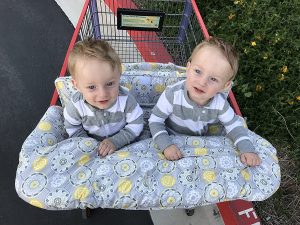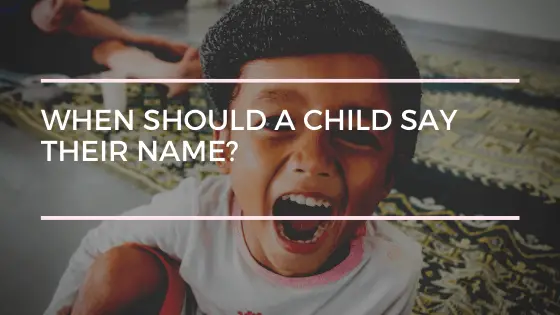Affiliate Disclosure – This post may contain affiliate links where we may receive compensation if you purchase products linked below. As an Amazon Associate, I can earn from qualifying purchases. This doesn’t cost you anything and helps keep our little blog running. Read our privacy policy for further information.
As the parents of twins who generally are a bit behind in their speech compared to singleton’s, we begun researching the different speech milestones by age and wanted to share our findings. This post looks at:
- When do babies begin making their first few words?
- How many words should an infant say at 18 months?
- How many words should an infant say at 24 months?
- How many words should a 3 year old say?
- How you can encourage a toddler to talk?
- How delayed are twins when it comes to their speech?
We look at these questions while researching various sources including Healthline and Parents.
What’s Normal and When to Seek Medical Advice
Before we jump into this post, it’s important to call out that the dates in this post are an indication only and every child is different to when they hit these different milestones. Don’t be alarmed if you’re reading this post and concerned that your child isn’t hitting what we discuss at the different age milestones.
What’s most important is that your child is making sounds and trying to communicate. If they aren’t trying to communicate or if you’re just generally concerned about the development of their speech, we’d recommend booking in to see your local healthcare professional and seeing expert advice.
When Do Babies Say Their First Word?
 Most babies say their first words from around the 10-14 month period. Generally these first words are either “mama” or “dada”.
Most babies say their first words from around the 10-14 month period. Generally these first words are either “mama” or “dada”.
When Will My Toddler Say Their Name?
By around the 24 month mark is when your child should begin saying their name. This ultimately depends on their name though with some names being more difficult to pronounce than others. For example “Jack” is a lot easier to pronounce than “Alex”.
How Many Words Should an 18 Month Child Say?
At around the 18 month mark, your child should also be hitting other milestones beyond their vocabulary. This includes:
- Impersonating your sounds at around the 12 month mark
- Identify parts of their body by around the 15 month mark
- Name and point to familiar objects by around the 14-18 month mark
- Follow directions by around the 12 to 15 month mark
- Vocabulary that’s expanded to 10 words by around the 18 month mark
How Many Words Should a 24 Month Say?
 At around the 24 month mark, your child should be starting to hit all the above milestones plus the below. This is a super fun age as you begin to see your little one’s vocabulary begin to quickly expand:
At around the 24 month mark, your child should be starting to hit all the above milestones plus the below. This is a super fun age as you begin to see your little one’s vocabulary begin to quickly expand:
- Begin saying their name by around the 24 mark depending on how complex their name is
- Expanded vocabulary which will quickly increase beyond to mama and dada to other things like truck or car.
- Practicing two word sentences at around the 24 month mark with requests like “dada car”
- Their speech can be quite vague still where only 50% of their speech will make sense
- Better understanding of the world around them by being able to point to objects that you call out (e.g. point to daddies shoes)
How Many Words Should a 3 Year Old Say?
While at around the 3 year old mark, your little one should be beginning to hit the above milestones while starting to hit the below:
- Be able to combine 3-6 words in a sentence by around the 3 year mark
- Have much more clearer speech where you’ll be able to understand most to 75% of what they are saying at around the 3 year mark
- Know which words to choose. Gone are the days of pointing at objects and not knowing what word to use. At around the 3 years mark, your child will begin knowing which word to use rather than feeling the need to point at things.
- Follow requests that have multiple actions for example “Please go take your shoes off, wash your hands and sit at the dinner table”.
How to Encourage a Toddler to Talk?
 Some parenting blogs really over-complicate this one so let’s try keep it simple:
Some parenting blogs really over-complicate this one so let’s try keep it simple:
- Spend the time talking to your child while also mixing it up with reading and singing to them
- Explain the world around them. For example, when you’re out in public call out to them if you see a truck and explain what colour it is)
- Making the effort to simplify the pronunciation of words. Following the above example, if you see a truck out in public, make the effort to simplify the pronunciation of the word by breaking the pronunciation up into something they can practice (e.g. Truh-k)
If you’re still struggling with the above, we’d also recommend:
- Creating a photo book – We recommend putting photos of yourselves, family members and other objects and people you’re trying to build into your little one’s vocabulary. Creating photo books online with photos from your phone is a cheap exercise these days so why not put one together through a website like Snapfish?
- What’s your name game – Help them practice their name by constantly asking them what their name is and then answering the question for them by slowly and breaking up the pronounciation of their name. For example with our boys Frank and Jack we would say “Frrrr-ank” for Frank and “”Jaa-ck” for Jack.
Do Twins Have Delayed Speech?
 We know that speech in twins is generally a bit delayed which has been attributed to twins creating their own language between one another. This delay in twins is even more so for identical twins who are generally behind fraternal (non identical twins).
We know that speech in twins is generally a bit delayed which has been attributed to twins creating their own language between one another. This delay in twins is even more so for identical twins who are generally behind fraternal (non identical twins).
How delayed are twins when it comes to speech? A study which looked at the development of speech in twins and singletons found that 71% of twins were not combining two words at the age of 2. While only 17% of singletons were not combining two words at the age of 2.
Closing
We hope this article on understanding your child’s speech has been useful for you.
As we said at the start of the post, if you’re feeling concerned that your child isn’t quite hitting the milestones above, we’d recommend seeking professional advice from a medical professional who can help assess and create a plan to get them on track.
Thanks for reading!
Affiliate Disclosure – This post may contain affiliate links where we may receive compensation if you purchase products linked below. As an Amazon Associate, I can earn from qualifying purchases. This doesn’t cost you anything and helps keep our little blog running. Read our privacy policy for further information.

My name’s Alex and I’m a husband, dad to beautiful identical twin boys, cyclist, photographer and connoisseur of great coffee!
Help I’m Having Twins has been created for me to share what I found useful as a new parent and dad to twins.
